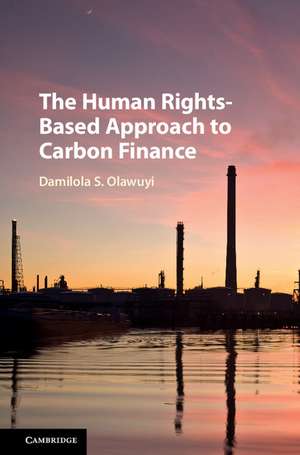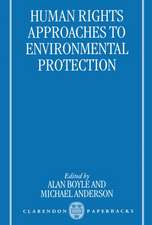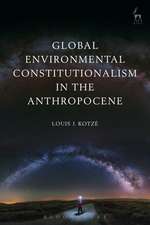The Human Rights-Based Approach to Carbon Finance
Autor Damilola S. Olawuyien Limba Engleză Hardback – 8 iun 2016
| Toate formatele și edițiile | Preț | Express |
|---|---|---|
| Paperback (1) | 324.79 lei 6-8 săpt. | |
| Cambridge University Press – 12 dec 2018 | 324.79 lei 6-8 săpt. | |
| Hardback (1) | 787.12 lei 6-8 săpt. | |
| Cambridge University Press – 8 iun 2016 | 787.12 lei 6-8 săpt. |
Preț: 787.12 lei
Preț vechi: 915.26 lei
-14% Nou
Puncte Express: 1181
Preț estimativ în valută:
150.61€ • 157.68$ • 124.62£
150.61€ • 157.68$ • 124.62£
Carte tipărită la comandă
Livrare economică 05-19 aprilie
Preluare comenzi: 021 569.72.76
Specificații
ISBN-13: 9781107105515
ISBN-10: 110710551X
Pagini: 440
Ilustrații: 2 b/w illus.
Dimensiuni: 152 x 229 x 25 mm
Greutate: 0.75 kg
Editura: Cambridge University Press
Colecția Cambridge University Press
Locul publicării:New York, United States
ISBN-10: 110710551X
Pagini: 440
Ilustrații: 2 b/w illus.
Dimensiuni: 152 x 229 x 25 mm
Greutate: 0.75 kg
Editura: Cambridge University Press
Colecția Cambridge University Press
Locul publicării:New York, United States
Cuprins
Part I. Carbon Projects and Human Rights: Introductory Context and Principles: 1. Introduction; 2. Climate change projects and human rights struggles; Part II. Mainstreaming Human Rights Safeguards into the International Legal Regime on Climate Change: 3. The concept of mainstreaming in international law; 4. The human rights mainstream paradigm and the question of approach; Part III. The Human Rights-Based Approach to Carbon Finance: Nature, Elements and Content: 5. Normative contents/elements of the human rights-based approach; 6. Legal framework for implementing the human rights-based approach to carbon finance; 7. Mobilizing structures: institutional framework for implementing the human rights-based approach to carbon finance; Part IV. From Theory to Practice: Practical Challenges, Paradoxes and Potentials of a Human Rights-Based Approach to Carbon Finance: 8. Making mainstreaming work: a three-step approach to implementation; 9. Minding the gap: practical paradoxes and barriers to the adoption of a human rights-based approach to carbon finance; 10. Implementing a human rights-based approach to carbon finance: summary for policy makers.
Recenzii
'Damilola S. Olawuyi has tackled the intersection of three issues of great complexity and even greater importance: the design of projects that are needed to reduce our greenhouse gas emissions, and thus avoid the worst effects of climate change; the methods being used to pay for these projects; and the effect that the projects will have on the communities (often indigenous populations) that live in or near the places where these projects are carried out. This book displays a mastery of the actual problems these projects face in the real world … It also presents concrete proposals for reconciling at least some of the conflicts. Human rights and climate finance have too often been very separate spheres of study; Olawuyi has now brought them together in a way that performs a great service in helping us understand and constructively deal with the tensions between them.' Michael B. Gerrard, Andrew Sabin Professor of Professional Practice, and Director, Sabin Center for Climate Change Law, Columbia Law School
'This book is about the big issue in the transition to sustainability - the linking of equity with sustainability. No longer is it tolerable to focus only on environmental impact. Development must be approached and financed through the triple lens of environmental, social and economic sustainability … The book discusses what this means in practical terms - an expanded role for bodies presently engaged in screening carbon projects, a requirement for a specific human rights impact assessment, review mechanisms, better governance and compliance and complaints committees. Dr Damilola S. Olawuyi has written a clear, well-informed and documented work, in a field which should and does engage all of us ever more.' The Right Hon. The Lord Jonathan Hugh Mance, Justice of the Supreme Court of the United Kingdom and Chair, International Law Association
'This book is about the big issue in the transition to sustainability - the linking of equity with sustainability. No longer is it tolerable to focus only on environmental impact. Development must be approached and financed through the triple lens of environmental, social and economic sustainability … The book discusses what this means in practical terms - an expanded role for bodies presently engaged in screening carbon projects, a requirement for a specific human rights impact assessment, review mechanisms, better governance and compliance and complaints committees. Dr Damilola S. Olawuyi has written a clear, well-informed and documented work, in a field which should and does engage all of us ever more.' The Right Hon. The Lord Jonathan Hugh Mance, Justice of the Supreme Court of the United Kingdom and Chair, International Law Association
Descriere
Outlines a human rights-based approach to carbon finance, a framework for mainstreaming human rights into carbon project implementation.














